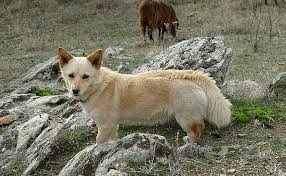
Dikkulak
Conditions of detention
Dikkulak dogs are best suited for outdoor environments where they have space to roam and perform their guarding duties. They thrive in rural areas with large yards or farms.
Useful Fact: Despite their adaptability, Dikkulaks are not well-suited for apartment living due to their need for space and activity.
Nutrition and diet
A balanced diet is essential for the health of a Dikkulak. High-quality commercial dog food, supplemented with fresh vegetables and protein sources, is recommended.
Useful Fact: Feeding them a diet formulated for active breeds helps maintain their energy levels and overall health.
Health
Dikkulaks are generally healthy dogs with few breed-specific issues. Regular veterinary check-ups are important to ensure their well-being.
Useful Fact: Common health screenings include checks for hip dysplasia and eye conditions.
Grooming and care
Dikkulaks have a short coat that requires minimal grooming. Regular brushing helps remove loose hair and keeps their coat healthy.
Useful Fact: Their grooming needs are low, making them easy to care for compared to long-haired breeds.
Education and training
Dikkulaks are intelligent and eager to please, making them highly trainable. Consistent, positive reinforcement methods work best.
Useful Fact: Early socialization and obedience training are crucial for developing well-mannered pets.
Toys and entertainment
These active dogs enjoy a variety of toys, especially those that challenge their mind and body, such as puzzle toys and fetch toys.
Useful Fact: Interactive toys can help keep them mentally stimulated and prevent boredom.
Safety
Ensure a secure yard as Dikkulaks can be curious and may try to escape if they catch a scent. Microchipping and ID tags are recommended.
Useful Fact: They have a strong prey drive, so keeping them on a leash during walks is advisable.
Accessories
Essential accessories for Dikkulaks include a sturdy collar, leash, and a comfortable bed. A crate can be useful for training and travel.
Useful Fact: Harnesses are recommended for walking to prevent strain on their neck.
Socialization
Early and regular socialization helps Dikkulaks become well-adjusted adults. Introduce them to various people, places, and other animals.
Useful Fact: Puppy classes can provide a controlled environment for socialization and basic training.
Travel and Transportation
Dikkulaks travel well if accustomed to it from a young age. Secure them in a travel crate or with a dog seatbelt for safety.
Useful Fact: They can be good travel companions due to their adaptable nature
Behavior and psychology
Dikkulaks are known for their alertness, intelligence, and loyalty. They need regular mental and physical stimulation to prevent behavioral issues.
Useful Fact: Providing tasks and engaging activities can help manage their high energy levels.
Legal aspects
Check local regulations for pet ownership, including licensing and leash laws. Ensure vaccinations and health records are up-to-date.
Useful Fact: Some regions may have specific rules regarding dog breeds and public behavior.


